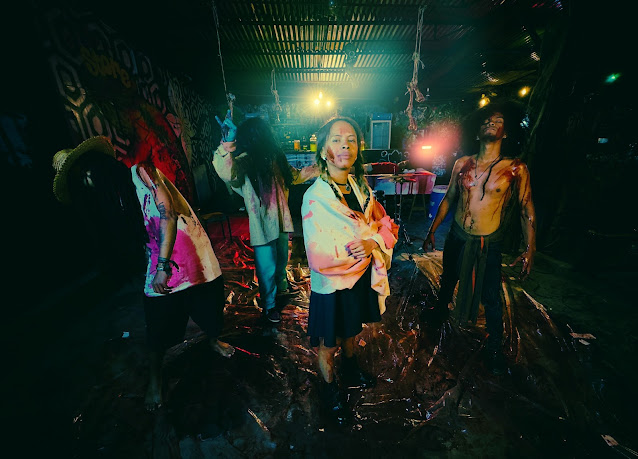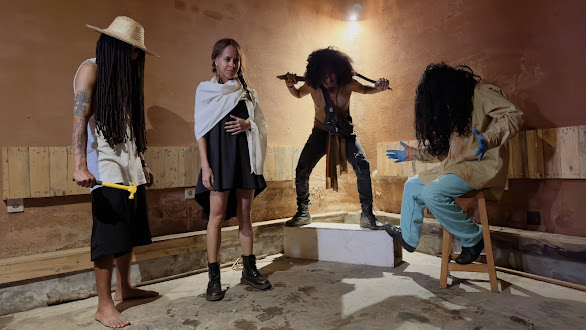Madagascar’s LohArano return with YMAIMA, a fearless EP blending heavy metal and traditional rhythms to confront taboo issues like displacement, violence, and organ trafficking. In this interview, they speak out.
1. Your
new EP YMAIMA is a stark and unflinching reflection of the harsh realities in
Madagascar. What compelled you to tackle such heavy, often silenced issues in
your music?
Hello,
first of all, thank you so much for taking an interest in what we do. The
topics we address are often inspired in the same way as our music itself. It
comes from this need to express and share, to scream out the daily rage and
frustration that we try to suppress, yet that is always present. How can we fix
something if we don’t talk about the problem? Many already sing about love and
peace, but that’s not all there is. If we ignore the darker side and treat it
as taboo, it’s like blindfolding ourselves and living in the illusion of a rosy
life, which is clearly not the reality we’re facing today.
2. Each
track on the EP addresses a different social crisis — from displacement and
violence to organ trafficking. How did you choose which stories to tell, and
how did you approach them artistically?
These
aren’t just stories, they’re present-day realities that our people are facing.
Even though the information is heavily filtered, testimonies and reports still
circulate about what’s happening. Especially with social media, we now have
access to more than what the mainstream media shows us, media that is often
silenced by fear or by the money of those in power.
3. “Run
& Die” portrays people forced to become refugees in their own land. Was
this song inspired by specific events or testimonies you’ve encountered?
Yes, for
years we’ve heard testimonies of people being evicted from their land, claimed
by those with more power. The evidence often surfaces only when the issue
starts to gain attention. In April 2025, residents of Nosy Sakatia had to
confront authorities trying to remove them for tourism development.
Though the song speaks of Madagascar, it also honors war refugees forced to
flee for survival. Our thoughts are with the victims of the ongoing conflicts
in the Middle East.
4. In
“RODO,” you address the terror of the dahalo. How do you translate such daily
fear and instability into your sound and lyrics without losing hope?
The dahalo
have been part of our lives since childhood. Even without direct encounters,
stories from our families and communities revealed the fear they bring to
affected regions.
This track describes what we know of a typical dahalo raid, the mindset,
rituals, adrenaline, and even their fear, as they’re still human.
Musically, we mixed thrash metal with kilalaky, the rhythm they use in
post-raid celebrations.
5.
“Mpaka Taova” is deeply disturbing and personal. What was the emotional impact
of writing and performing a song about child kidnappings and organ trafficking?
Seeing
photos of mutilated people almost every day, decapitated women, missing
children, leaves no one indifferent. It brings deep sadness, anger, and fear,
because this isn’t fiction.
Interestingly, the writing process took a different turn, we were inspired by
“Hira Gasy,” a traditional Malagasy oratory art form often filled with
punchlines or blunt humor, used to denounce social and political injustice.
You’ll probably notice that in the translated lyrics.
6.
Musically, your blend of rock and metal with Malagasy rhythms like tsapiky and
salegy is groundbreaking. How do you balance tradition with innovation in your
songwriting?
We know our
need for intense emotion as fans of heavy and extreme music, and we also know
the melodies and rhythms we grew up with at home. The rest comes down to work
and research.
7.
LohArano has been part of major festivals like Hellfest and featured on
Yellowjackets. Has this international attention changed how you view your role
as artists?
It mostly
confirmed for us the impact and reach our music and message can have, how far
we can be heard and understood…
8. What
reactions have you received from Malagasy listeners about your decision to
speak out so directly on taboo topics?
Everyone
reacts based on their personality, how they perceive things, and what they’re
looking for. You can like or dislike the music. Rock and heavy metal were never
meant to please, it hits hard and it shocks, both musically and lyrically.
So it’s normal that some are shocked or even repulsed by the form, too loud,
too violent, “unlistenable.” Others agree with the topics we address, because
it’s a reality they relate to. And those who cheer us on are the ones who also
wanted to scream it out loud, the badass ones, haha.
9. Is
there a particular message you hope international audiences will take away from
YMAIMA?
Even though
our message is often aimed at the local population, for international
audiences, it’s also a chance for us to speak out, to share and denounce the
social realities we live through on our island.
Beyond ethnic and cultural differences, who else can we turn to, to express our
emotions, if not our greater family, the human race?
10.
Finally, what’s next for LohArano after this EP? Are there plans for a full
album, more collaborations, or further activism through music?
We are currently working on our second album. Collaborations and themes will be guided by our feelings and inspirations, what we’re living in the moment. We’ll discover it all together when the album is released ;)
LohArano (@loharano_official) • Photos et vidéos Instagram
LohArano - Mpaka Taova, organ dealers (official video)




Post a Comment